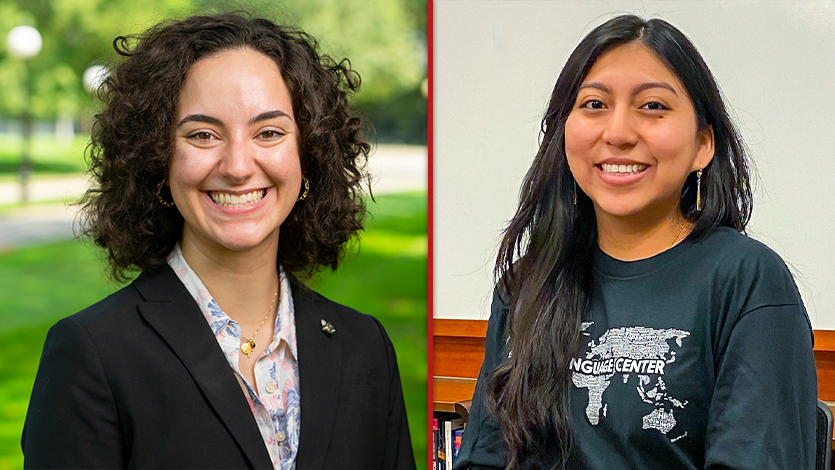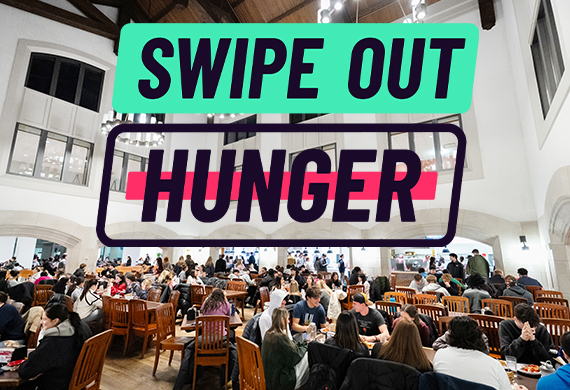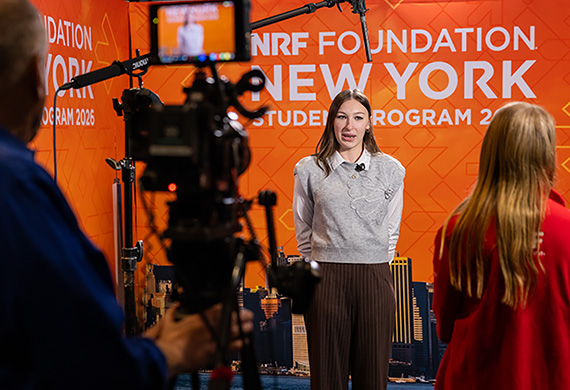Weiss Language Center Student Managers Accepted at International Conference

March 29, 2022 — Since March 2020, Mia Garofalo ’23 (top image, left) and Catherine Illescas-Duque ’23 (top image, right) have been completing valuable research on the use of conversational-user interfaces in assisting language learners in the medical field.
Recently, Garofalo and Illescas-Duque had their research project “Viability of Voice User Interfaces in Second Language Learning and Repetitive Conversational Tasks” accepted to present at the International Technology, Education and Development Conference (INTED) conference in Valencia, Spain.
Their research began in the Weiss Language Center at Marist where both Garofalo and Illescas-Duque are student managers, “We wanted to investigate the feasibility of VoiceFlow, a software for programming conversational-user interfaces, such as Amazon’s Alexa, to be a helpful platform for language learners to use to achieve intermediate-level proficiency. We specified further by researching how language learners in the medical field could use this software to develop the skills necessary to be successful when completing repetitive tasks, like asking for COVID-19 questionnaires when providing vaccinations,” said Garofalo.
Mia Garofalo ’23 presenting research in Orlando, FL at the National Collegiate Honors Council in October, 2021
Garofalo is a double major in Psychology and Spanish with minors in Cognitive Science and Philosophy. She is also a student of the Marist Honors Program. Illescas-Duque is majoring in Biology with minors in Psychology and Spanish. The two students met in their first semester at Marist when they were both enrolled in Dr. Kevin Gaugler’s Spanish in a Digital Age course. Dr. Carolyn Matheus, Director of the Honors Program and Professor of Information Systems worked closely with Garofalo and the rest of the team on the research project. Garofalo attributes her interest in theories of language learning as stemming from this course, “I have developed a growing passion for applying psychological principles of language learning to Computer-Assisted Language Learning (CALL), and I aim to carry my understanding of language acquisition into how we orient ourselves as not language tutors, but language coaches and language learning facilitators at the Weiss Language Center,” said Garofalo.
Dr. Gaugler, Professor of Spanish and Director of the Weiss Language Center, sees the importance of undergraduate research and Garofalo and Illescas-Duque’s work. “Mia and Catherine's work is a wonderful example of how undergraduate research in both technology and languages can help advance the social good. The Weiss Language Center, among other goals, supports research in innovative uses of technology to enhance knowledge in world languages and cultures. I am happy to be working with such talented students and couldn't think of a timelier topic. Dr. Matheus' expertise in technology and her leadership in the Honors Program has certainly been invaluable to advancing undergraduate research at the Center and at the College.”
Throughout their time working on this project, Garofalo and Illescas-Duque developed a strong bond as research partners and friends, “After a few months working together our partnership turned into a beautiful friendship. While working by her side and with the team, I’ve seen how dedicated and passionate Mia is about the conversational-user interfaces research and her academics overall. She has a bright personality and brings a smile to every language coach in the center as soon as she walks in. It has been a pleasure to be co-partners and friends with her over the past year.” said Illescas-Duque.
Dr. Kevin Gaugler (standing) at the Weiss Language Center
Both Garofalo and Illescas-Duque are eager to apply the skills and knowledge that they acquired through their undergraduate research to their future careers and postgraduate education.
As a native Spanish speaker, Illescas-Duque chose to minor in Spanish to enhance her linguistic skills and aid in her future career as a Physician Assistant. This research project allowed Illescas-Duque to directly examine how healthcare and linguistics are connected, “During our research, we discovered that there was a small percentage of healthcare workers that speak Spanish which was an important factor to consider during the COVID-19 pandemic and while analyzing how second language acquisition could be achieved with user interfaces. We wanted to create a platform that not only served healthcare professionals but all the careers in Human Services,” said Illescas-Duque.
Upon graduation, Garofalo plans on pursuing a Master’s in Organizational Behavior or Industrial/Organizational Psychology. She wants to emphasize the value of education justice and technology as a tool for increasing accessibility in her postgraduate work with businesses and organizations. Garofalo identifies much of her interest in these fields as a reflection of her time at the Weiss Language Center, “My knowledge of language learning theory applications has seriously impacted my plans post-graduation, as I would not have the passion for language learning without my experiences at the Weiss Language Center,” said Garofalo.



